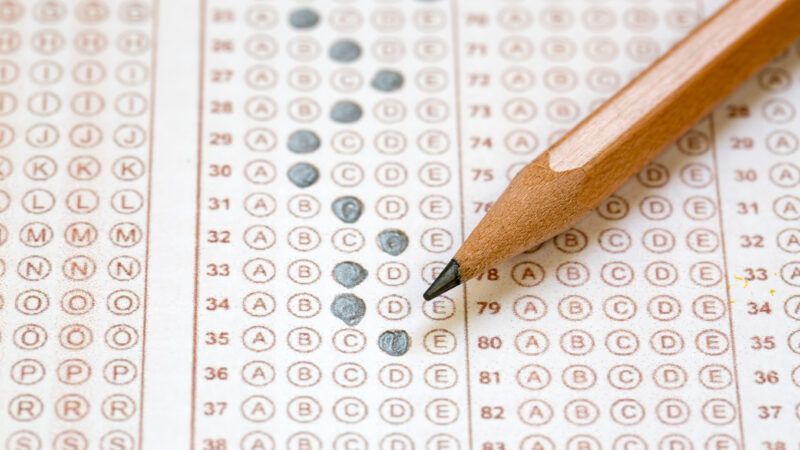Could Elite Colleges Embrace the SAT Again?
There's increasing evidence that standardized tests accurately measure student achievement and are helpful, not hurtful, to disadvantaged applicants.

After a yearslong trend of elite colleges dropping standardized test requirements from their applications, the tide seems to be turning for the SAT. Long derided as unfair, unnecessary, or even sexist and racist, college entrance exams are gaining new defenders who point out that, contrary to common conception, standardized tests help—not hinder—talented yet disadvantaged students.
On Sunday, The New York Times published an extended article by David Leonhardt making this exact case. Leonhardt argues that the trend among elite colleges of ditching mandatory SAT or ACT test requirements for applicants is misguided and that the reasons typically given for removing the requirement—that the tests punish disadvantaged students and don't meaningfully correlate with college success—are factually incorrect.
"Amid all the subjectivity in the admissions process, the SAT and ACT — even with their flaws — offer meaningful information about an applicant's readiness to do high-level academic work." Leonhardt writes. "The tests create a fixed benchmark that can be more reliable than high school grades, teacher recommendations or extracurricular activities."
While many are put off by the persistent score gaps across racial and economic lines, the idea that ditching the test will help minority students or those from low-income families is short-sighted. Yes, SAT scores correlate with income and race—but so do high school GPAs and essays, the other metrics elite colleges most often rely on in the absence of test scores.
GPA is a particularly muddy metric to rely on when making admissions decisions for highly selective colleges, as rigor—and grade inflation—varies widely between high schools. Leonhardt highlighted two recent studies that show this. One found that SAT scores were much more predictive of success (such as being admitted to a top graduate school or being employed by a prestigious firm) than high school GPA. The second found that college grades were much better predicted by standardized test scores than by high school grades.
Standardized test scores simply measure student academic performance better than high school grades. And persistent racial and economic gaps don't render these results meaningless. In fact, they're completely unsurprising.
"The existence of racial and economic gaps in SAT and ACT scores doesn't prove that the tests are biased. After all, most measures of life in America — on income, life expectancy, homeownership and more — show gaps. No wonder: Our society suffers from huge inequities," Leonhardt notes. "The relatively high Black poverty rate is not a sign that the statistic is biased. Nor would scrapping the statistic alleviate poverty."
Essays aren't a good alternative to standardized tests either. A 2021 study published by Stanford University's Center for Education Policy Analysis found that scores on student college application essays correlated more closely with household income than SAT scores do.
Ultimately, those who stand to benefit most from test-optional admissions aren't disadvantaged students but mediocre wealthy ones. Standardized test scores, while imperfect, are the closest to an objective measure colleges have for making admissions decisions—one that isolates academic achievement from expensive extracurriculars and tutor-polished essays.
Thankfully, one college has changed course after going test-optional. After suspending SAT and ACT requirements for two years, the Massachusetts Institute of Technology announced in 2022 that it would return to requiring standardized tests, arguing that "research shows standardized tests help us better assess the academic preparedness of all applicants, and also help us identify socioeconomically disadvantaged students who lack access to advanced coursework or other enrichment opportunities that would otherwise demonstrate their readiness for MIT."
Hopefully more colleges—and more progressive education reformers—will listen to the increasing evidence that the SAT is an asset for talented yet disadvantaged students, not a barrier to success.


Show Comments (26)